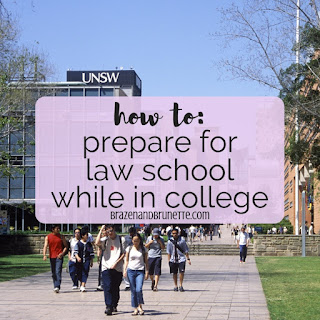Related: Law School Admissions Timeline
Pick your major wisely
Most importantly, your major should be an easy A and should be a good fallback in case law doesn't work out like you thought it would. As impressive as a super tough degree might sound, a 4.0 from an easy major will help you more in the long run because it will pretty much guarantee your acceptance into any school and also a damn good scholarship.Just as important, you need a relative major. I ended up with a BA in Spanish and seriously considered taking off a year to teach English in a Spanish-speaking country before I decided what I would do about law school. Make sure that you don't pick a blow off major that would be useless if you end up not being a lawyer.
Related: How to Choose a Pre-Law Major
Study for your LSAT in the summer
To have the best luck with getting into law schools, you're going to need the highest GPA and LSAT score possible. Trying to juggle both at the same time will most likely cause you to half-ass one area. Study for the LSAT like you have a 2.5 GPA and study for your tests like you got a 138.Diversify yourself
A former lawyer once told me that in regards to getting into law school, the worst thing you can be is a straight, white male. Push yourself out of your comfort zone and get involved with something unexpected to wow the admissions committee, such as volunteering at a suicide hotline or working with at-risk high schoolers.Prepare for your personal statement
Keep it in mind and be thinking about why you want to be a lawyer and how your super interesting life has helped you come to that conclusion. Also, think of this as talking your way into law school, or your elevator speech, and really sell yourself to the admissions committee. Absolutely don't forget to mention why this particular school is perfect for you and how you are perfect for them. Make sure you get someone who's really good at reading, writing, and editing to look over your personal statement, preferably by a professor and someone who is familiar with the law school themes you're talking about.Related: Personal Statement Advice
Start on rec letters early
Every semester, starting as early as possible, look at the classes that you're doing the best in (B's and A's) and drop by your professor's office hours. After a few meetings, show your interest in going to law school; it sounds really good for a rec letter to say "She's been working towards this dream for the last 3 years." Eventually, mention that you would eventually like for them to write you a rec letter so that they can be thinking about what to say. Bonus points for professors for your major, professors that have taught you an undergrad law class, or professors who are really good at writing (English/ Literature). Have these locked in the first few months of your senior year. Also, let them know that you will have to request for the LSAC to email a recommendation form to your recommender and they will most likely have to upload that without your help at all.Also, if you get a really cool internship somewhere, don't bother asking a state Representative or someone to write a rec letter for you. Yeah a high up official seems impressive, but not when they take the same letter and just replace your name from the last person who asked for one. If a law school gets the same letter for 8 different applications, then you're not standing out like you could be.
Related: How to ask for a rec letter
Join a Pre Law organization
Through Phi Alpha Delta I got to hear advice from a variety of lawyers, law students, law school admissions counselors, and law professors. I also found a lot of helpful tips from my fellow members. On top of that, this organization provided me with great résumé builders such as two different leadership positions and volunteer experience.Remember quality over quantity
Here's the thing about student organizations- people fall for the misconception that the more organizations, the better because you look involved. It's best if you join a few worthwhile organizations and get really involved. Being President of the Retail society and Secretary of an Honors society is better than just a member of the Paintball club. You only get to submit a one-page resumé with your application, so fill it up with meaningful involvements.Related: What to Put on a Law School Resumé
Try to visit some schools
And make sure you let them know you're coming! A tour, a conversation with the Dean of Admissions, attending an open house, a sit-in of a class, and talking with current students are all a great way to show interest and decide what you're looking for in a law school. When you're writing your personal statement, you can include a paragraph talking about how this visit made you want to go here. This is also a good way to potentially get a voucher to waive your application fee for a school.Get your school visit checklist here
Save $1,500 for the LSAT
While the test itself is actually only (ha) $200, your average prep course is about $1,300. The sheer price of the investment I had put into this test gave me major test anxiety. Luckily I had a Kaplan discount through Phi Alpha Delta, but it was still a lot for a test considering that the ACT was only around $50. Also, you have to pay a fee for the Law School Admissions Council through which you'll be applying to schools and registering for the test. And then an additional $175 for this stupid thing called CAS. And then you also have to pay for your application fees so yeah, this process is expensive from the get go.Be careful with grade replacements
Fun fact that I found out after it was too late – when you retake a class it will increase your undergrad GPA by replacing a D or F with a higher grade, but for law school admissions they will calculate your GPA as you took the class twice. So if you get an F and then retake it and get an A, your undergrad GPA will probably jump like .5, but that F will stay on your transcript for law school and really pull your GPA down. You're better off not getting into the "I can just retake it" mentality.Your school doesn't matter
When it comes down to it, law schools don't factor in your undergrad school as much as you'd think. People can get into law school from taking online classes from a community college. So don't think that you have to choose what college you go to just because you think it will look impressive on your application. I'm not saying that universities that also have a law school don't consider this, I'm just saying it's not everything.
What you do in HS doesn't matter
If you're putting anything from high school on your law school application, you're doing it wrong. Your undergrad accomplishments should be so that they overshadow your HS accomplishments, unless it was something major like you started your own business or you can say you've been doing mock trial for the past 8 years throughout college and high school. But law school admissions are looking for more than just President of NHS. Be involved in high school to look good for your college applications, but know that law schools probably won't even care about what you do.
let's be friends!






















0 comments:
Post a Comment